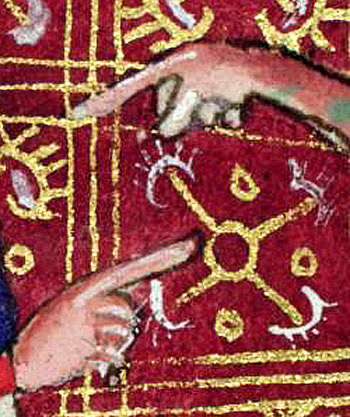Arthur
General Information
Plot Summary

Arthur is the son of Uther Pendragon and Ygerne, wife of the Earl of Cornwall, whom he impregnates with Merlin’s help. Arthur succeeds his father as king and is noble and well-loved; he sets up his Round Table at Carlisle and conquers Scotland, Ireland and Gotland. Afterwards, his knights live peacefully for twelve years until Arthur invades France, besieging Paris and defeating the Roman governor Frollo in single combat. Here, the poet urges the audience to say a Pater Noster in celebration.
Arthur remains in France, conquering the lands around Paris and distributing them among his friends before returning to Britain. At Easter he holds a feast, attended by many kings, earls, clergy and knights, and the audience are urged to say another Pater Noster. On the third day, a letter arrives from Lucius, the Roman Emperor, castigating Arthur for taking France and demanding that he pay tribute and undertake penance. Preventing his knights from slaying the messenger, Arthur sends Lucius a reply, claiming descent from Emperor Constantine and demanding his own tribute. The messengers warn Lucius of Arthur’s strength, and the audience are called to say a Pater Noster and an Ave Maria.
Arthur gathers an army and, leaving Mordred in charge of his kingdom, sails to Barfleet, while the poet asks for another Pater Noster. On arriving, the king learns that a Spanish giant has ravaged Elaine, cousin of King Hoel. With the help of Bedevere and Kay he seeks out and beheads the giant, building a chapel of St Mary to house Elaine’s tomb. Lucius approaches with an army of Christians and Saracens, vastly outnumbering Arthur’s men. Ignoring suggestions that they retreat, the Britons pray to God for help, and the audience are requested to say another Pater Noster. In the battle that follows, Lucius is slain: Arthur sends his body back to Rome and buries his own dead, including Bedevere, in abbeys. The Britons remain until winter and praise God for helping their country, whose racial make-up the poet details before requesting another Pater Noster.
While preparing to conquer Rome, Arthur learns of Mordred’s betrayal. He sails back to Britain and they fight a bitter battle, during which Gawain is slain. Mordred flees to Cornwall, pursued by Arthur, while Guinevere becomes a nun at Caerleon. Gawain’s body is sent to Scotland, and many Northern men join Arthur’s army before he marches on Cornwall. At last Mordred is slain, but Arthur is mortally wounded. He is carried to Avalon, now Glastonbury, where he dies and is buried in the choir, disproving claims that he will return. The poet calls for a final Pater Noster and refers his audience to the ‘French Book’.
From: Frederick J. Furnivall, Ed. Arthur: A Short Sketch of his Life and History in English Verse. Oxford: Oxford University Press, 1965. EETS o.s. 2
Manuscript: Longleat MS 55
Manuscripts
Click a title below to search for all romances in that manuscript.